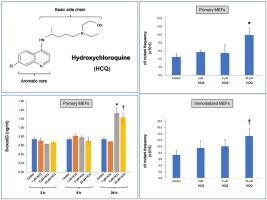DNA Repair ( IF 3.0 ) Pub Date : 2021-07-16 , DOI: 10.1016/j.dnarep.2021.103180 Ahmad Besaratinia 1 , Andrew W Caliri 1 , Stella Tommasi 1

|
Since the early stages of the pandemic, hydroxychloroquine (HCQ), a widely used drug with good safety profile in clinic, has come to the forefront of research on drug repurposing for COVID-19 treatment/prevention. Despite the decades-long use of HCQ in the treatment of diseases, such as malaria and autoimmune disorders, the exact mechanisms of action of this drug are only beginning to be understood. To date, no data are available on the genotoxic potential of HCQ in vitro or in vivo. The present study is the first investigation of the DNA damaging- and mutagenic effects of HCQ in mammalian cells in vitro, at concentrations that are comparable to clinically achievable doses in patient populations. We demonstrate significant induction of a representative oxidative DNA damage (8-oxodG) in primary mouse embryonic fibroblasts (MEFs) treated with HCQ at 5 and 25 μM concentrations (P = 0.020 and P = 0.029, respectively), as determined by enzyme-linked immunosorbent assay. Furthermore, we show significant mutagenicity of HCQ, manifest as 2.2- and 1.8-fold increases in relative cII mutant frequency in primary and spontaneously immortalized Big Blue® MEFs, respectively, treated with 25 μM dose of this drug (P = 0.005 and P = 0.012, respectively). The observed genotoxic effects of HCQ in vitro, achievable at clinically relevant doses, are novel and important, and may have significant implications for safety monitoring in patient populations. Given the substantial number of the world’s population receiving HCQ for the treatment of various chronic diseases or in the context of clinical trials for COVID-19, our findings warrant further investigations into the biological consequences of therapeutic/preventive use of this drug.
中文翻译:

羟氯喹诱导哺乳动物细胞氧化 DNA 损伤和突变
自大流行早期阶段以来,羟氯喹(HCQ)作为一种在临床上广泛使用且安全性良好的药物,已成为药物再利用用于治疗/预防 COVID-19 的研究的前沿。尽管 HCQ 用于治疗疟疾和自身免疫性疾病等疾病已有数十年的历史,但这种药物的确切作用机制才刚刚开始被了解。迄今为止,尚无关于 HCQ体外或体内遗传毒性潜力的数据。本研究是首次在体外研究 HCQ 对哺乳动物细胞的 DNA 损伤和诱变作用,其浓度与患者群体中临床可达到的剂量相当。我们证明,用 5 和 25 μM 浓度的 HCQ 处理的原代小鼠胚胎成纤维细胞 (MEF) 中可显着诱导代表性氧化 DNA 损伤 (8-oxodG)(分别为 P = 0.020 和 P = 0.029),这通过酶联法测定。免疫吸附测定。此外,我们还发现 HCQ 具有显着的致突变性,用 25 μM 剂量的该药物处理后,原代和自发永生化 Big Blue® MEF 的相对cII突变频率分别增加 2.2 倍和 1.8 倍( P = 0.005 和P = 0.012,分别)。在临床相关剂量下可实现的体外观察到的 HCQ 基因毒性效应是新颖且重要的,并且可能对患者群体的安全监测具有重要意义。鉴于世界上有大量人口接受 HCQ 来治疗各种慢性疾病或在 COVID-19 临床试验中,我们的研究结果值得进一步研究该药物的治疗/预防使用的生物学后果。











































 京公网安备 11010802027423号
京公网安备 11010802027423号